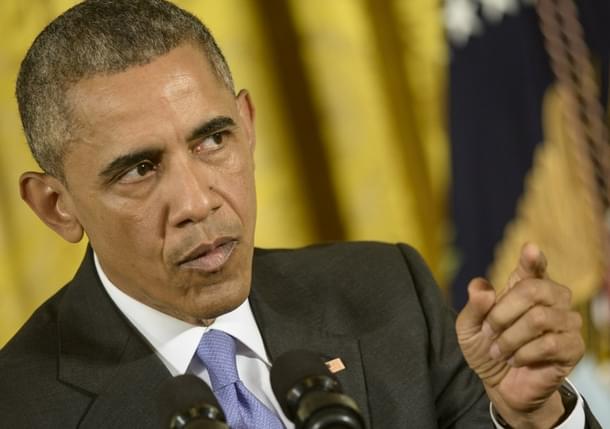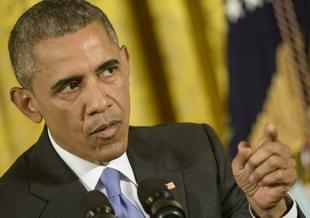World
How Must A Hawk View President Obama’s Nuclear Deal With Iran?
Vijay Rao
Aug 02, 2015, 06:49 PM | Updated Feb 12, 2016, 05:23 PM IST
Save & read from anywhere!
Bookmark stories for easy access on any device or the Swarajya app.


The great Sir Humphrey Appleby once reflected on the subject of political logic: “Something must be done. This is something. Therefore we must do it.”
It may distress you, dear reader, to learn that a pro-war, George W. Bush supporting hawk is writing this article. Or it may not. Either way, I counsel you to read on for I write in support of President Barack Obama’s new deal on nuclear deterrence with Iran. Before that though, we must revisit the recent past and understand how it is that we have arrived at the point that we have.
There is a narrative that I subscribe to, which goes like this: the US and its allies had turned around the disasters of 2006 in Iraq, and by 2010 were in a dominant position to facilitate a potentially stable future for that country. All that was required was a medium-term, low-volume, but consistent engagement to secure a kind of peace. By then however, maintaining a desert garrison was anathema to US popular opinion and to the President himself, so an ill-advised withdrawal was hastily enacted. You may disagree, but three senior National Security cabinet members of the Obama administration felt similarly, went on to resign, and described in detail their objections with the President’s view in bestselling autobiographies. One of them is even running for President now.
At the time, nobody was surprised. Us subscribers to the Freedom Agenda were already alarmed because by then President Obama had stupefyingly failed in his first major foreign policy test – the contested presidential election of Iran in 2009.
Few today remember Mir Hossein Mousavi, leader of the Green Revolution, true victor of the Iranian peoples’ mandate, and current persona non grata under house arrest in the dictatorship of the Islamic Republic. Some may remember the protests, with Green flags flying and cries of “Death to the Dictators” screamed from the rooftops of Tehran, Shiraz and Isfahan. You may even pause and reflect that you have not given a thought to poor Neda Soltan in six years – the 26 year old woman who became an internet sensation in death because of bloody Basiji retribution.
It bears remembering that at the time the President of the United States was silent.
Next came the Arab Spring, and another chance at relevance. What we got instead was leadership from behind, muddled objectives, and terrible consequences. Policy appeared to be made on the fly, with different rules for the different countries of Libya, Egypt or Syria. Then, in what can only be described as a botched attempt at futility, hashtags were deployed to address barbarism. And (to global horror) freelance journalists became frontline casualties instead of embedded reporters.
So it is in Syria that President Obama’s greatest foreign policy failure lies. Like Hamlet, he wavered – he failed to screw his courage to the sticking place – and whiffed on own his self-determined Red Line. I remember being ridiculed for my support of the Iraq War with terrible statistics of civilian casualties thrown in my face. Yet, if every single Iraqi civilian death from 2003 to now were to be laid at the feet of George W. Bush and the rest of us Iraq War supporters, the toll would still be less than the deadly tally in Syria from 2011 (a full eight years later) – now pray tell, shouldn’t Obama have an explanation too?
The fact is, with Syria, President Obama has overseen the greatest humanitarian catastrophe in recent history – certainly of a degree higher than Iraq under Bush. His competition in this category is actually a fellow Democrat – Bill Clinton – whose signal failure wasn’t infidelity, but rather his inaction in Rwanda.
Unsurprisingly, Syrian inaction led to Daesh (also called ISIS). Abandonment of Iraq precipitated Daesh’s spread, and we now live in a world where once again a Taliban-style regime controls large amounts of territory and resources, and plots violence against everybody. Daesh burns, Syria bleeds, Iraq weeps – and Iran continues its pursuit of devastating arms.
This brings us back to the seemingly perennial American obsession with WMD. Funnily enough, it used to be a global concern, but who remembers such things these days? It appears that Obama came into the White House with two clearly internalized foreign policy lessons – both, ironically, learned from Bush’s experience. The first, famously, was that no military invasions or engagements would continue. Second, and more pertinent, was that no rogue state would acquire nuclear weapons. Since theocratic Iran is obviously a rogue state, and also clearly the most likely to develop nuclear weapons, Obama resolved early on that he would diplomatically, and not aggressively, address this long-term problem. Polite conversation with a heinous regime requires abandonment of certain principles – and people.
There is a way to disagree with the administration’s current stance by saying that the President should have been more vocal in supporting the democratic opposition in Iran. If the Green Revolution had succeeded, goes my line, then Iran may have independently abandoned its weapons programs and automatically have become civil global partners. Here’s the thing: at the time in 2009 – being committed to disentanglement from Middle Eastern problems – Obama was not the right audience for that message. Furthermore, it was never fully clear that American involvement would truly assist the Green Revolution, or that its consequences would have been entirely benign.
It seems to me that Barack Obama’s deal with the Iranian Clerisy hinges on his silence in 2009. Like the lefties who disagreed with the Iraq War (well, they agreed with it at first but then changed sides), we are the right-wingers who hated Obama’s abandonment of the Iranian popular voice, but who now need to face up to the existing reality. As much as it sticks in my craw to say this, Obama’s silence during the Green Revolution may quite possibly have been the concession required to end Iranian nuclear weapons.
So the President punted (perhaps wrongly) on Iranian diplomats and bureaucrats. After many years, his punt has brought us a supposed commitment by a nasty and despotic regime: that Earth-shattering weaponry will be abjured for a meaningful amount of time. As much as we may hate the interlocutors, we should appreciate the fact that Obama is deliberately channeling Reagan on this one. Reagan famously negotiated nuclear deterrence agreements with the Evil Empire even while still criticizing its other abuses.
I put it to you this way: we have already hit rock bottom with US foreign policy. Bush made major mistakes yet had some valuable successes. Obama refused to learn from the successes and needlessly conflated the failures to the point of inaction. Blood has flown, communities have disintegrated, peoples have evaporated – it is time the world started to make sense again.
Here now we have a significant instance of the President really taking the initiative in foreign policy – laying out a doctrine and pursuing it to its end. He is demonstrating a long-term view, articulating a specific course of action, and living up to his role of navigating global currents to seek meaningful peace. Finally, is the Commander-in-Chief genuinely commanding!
Those of us who remember the unhealthy, knee-jerk opposition of the second Bush term should be circumspect when contemplating the current administration’s choice of action. As much as we have bemoaned Obama’s desultory foreign policy performance, we should not fall into the temptation of blind opposition that our detractors have exercised before, and which they expect of us now. It is in this light that serious skeptics should view the President’s deal with Iran and, with reservation, give it our considered support.
And not the President (nor our conscience) is asking us to abandon the cause of persecuted Persians and abandoned Arabs. The war for liberty, kindness and rationality doesn’t end. But perhaps after a long time, it can take on a tone and tenor of optimism. While potentially foolhardy, this very sense of hope may be exactly what the region needs. And wasn’t hope once a central part of Obama’s promise of change?
Vijay Rao is a writer based out of Bangalore.





